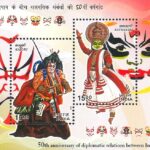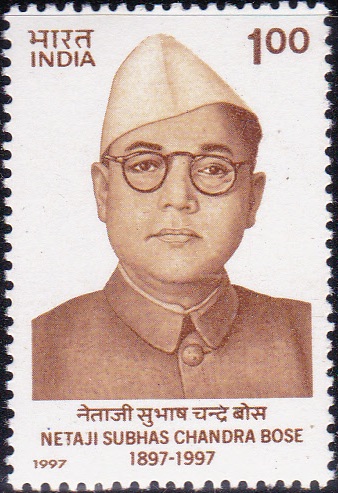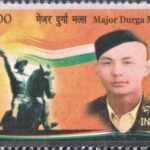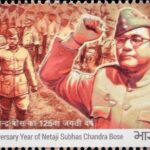
Rashbehari Basu
A commemorative postage stamp on Rash Behari Bose, an Indian revolutionary, a key organizer of Ghadar Mutiny and Indian National Army (INA) :
 Issued by India
Issued by India
Issued on Dec 26, 1967
Issued for : It was on the 26th December, 1941 that Shri Rashbehari Basu, as the President of the Indian Independence League had declared war against the British from Tokyo and this was a turning point in the struggle for India‘s independence, as from that date the Indian National Army developed and expanded with great vigour. The Posts and Telegraphs Department is greatly privileged to issue a special postage stamp in honour of Rashbehari Basu on the 26th December, 1967.
Type : Stamp, Mint Condition
Colour : Plum
Denomination : 15 Paisa
Overall Size : 3.34 X 2.46 cms.
Printing Size : 2.99 X 2.1 cms.
Perforation : 13½ x 14
Watermark : Printed on unwatermarked paper
Number Printed : 20,00,000
Number per issue sheet : 54
Printing Process : Photogravure
Designed and Printed at : India Security Press
Name : Rash Behari Bose
Born on May 25, 1886 at Palara Bighati, Hoogly, West Bengal, India
Died on Jan 21, 1945 at Tokyo, Japan
About :
- “I was a fighter,
One fight more;
the last and
The Best“.
The above aphorism of Shri Rashbehari Basu sums up the philosophy of his struggle. Rashbehari Basu was the first Indian revolutionary since 1857 who had planned and acted to overthrow the British Rule from India by armed insurrection. - He was born on the 25th May, 1886 at Palara Bighati village in the District of Hooghly, West Bengal. His father Shri Benode Behari Basu was an employee of the then Government of India. He received his early education at Chandernagore and Calcutta. According to his own statement, he began his revolutionary career when he was only fifteen. Inspired with the spirit of militant nationalism, he first tried to enter the Army but later on got a job in the Forest Research Institute at Dehra Dun. It was from here that he commenced his revolutionary activities. He was so adept in the art of secret organisation that even expert officers of the British Intelligence Police failed in their attempts to arrest him. It was he who managed the throwing of the bomb on Lord Hardinge on the occasion of his State entry in Delhi on the 23rd December, 1912.
- Rashbehari Basu left India for Japan in disguise In May, 1915. The British Police pursued him in Japan for nearly eight years to apprehend him dead or alive but he escaped until he eventually secured Japanese citizenship in 1923. In Japan, he learnt the Japanese language and wrote 16 voluminous books in that language on various subjects.
- It was Rashbehari Basu who founded the Pan Asian League. He also founded the Indian Independence League in 1924 to carry on India‘s freedom movement from the East. This organisation, during the World War II was a parent body of the historic Indian National Army. Rashbehari Basu became the President of the Indian Independence League and the Indian National Army till Subhas Chandra Bose took over in July, 1943. It was Rashbehari Basu who saved the lives, properties and honour of millions of Indians in South–East Asia from the Japanese Occupation Army by arrangement with the Japanese military headquarters during the World War II. He passed away in Japan on the 21st January, 1945 at the age of 60 years. The life and achievements of Rashbehari Basu can best be summed up in the following tribute paid to him by our late Prime Minister, Shri Lal Bahadur Shastri :
- “Shri Rashbehari Basu is one of those famous names which was on the lips of those of the younger generation during the early part of the 20th century, who were fired with deep patriotic urges and emotions. Shri Basu was dedicated to the freedom and Independence of India and he considered no sacrifice small for the attainment of his objective.“
- “He was gifted with a rare organising ability and during the First World War, he and his other comrades had planned an armed revolt of which he was the spearhead. When some of his plans were unearthed, he had to escape to Japan and undergo much suffering.“
- “A man of great faith and courage, he lived up to the traditions of the renowned leaders and patriots of Bengal who have left behind a deep and lasting impression on our countrymen.“








Don’t provides wrong information about the birthplace of great revolutionary Rashbehari Bose. Rashbehari Bose was not born in palara Bighati. he was born in village-Subaldaha Block-Raina 2,Dist-Purba Bardhaman,Westbengal…..please correction it
Thank you for your concern… But, all the information given here are provided in the Brochure published by India Post with this stamp issuance..
Don’t provide wrong information about Rashbehari Bose birthplace. Rashbehari Bose was born in village Subaldaha in purba bardhaman district not palara bighati.
Please delete wrong information and provide right information as soon as possible. Ok
This information provided by Indian Govt. during issuance of this stamp. Hope this will settle your queries.
[…] episodes from India’s National Movement concerning leaders like Netaji Subhas Chandra Bose and Ras Behari Bose, who had close ties with Japan. The post-Independence era saw the formalising of the friendship. […]
[…] Ghadar Party. Other prominent leaders of the Ghadar Party were Taraknath Das, Mohammed Barkatullah, Rash Bihari Bose and Vishnu Ganesh […]
[…] India‘s doorstep and gave a new opportunity to Netaji. Invited by the veteran revolutionary, Rash Behari Bose, Netaji arrived in Japan in June, 1943, after a ninety-day submarine voyage full of peril and […]